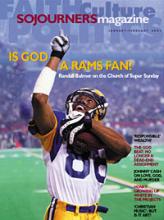As the archives of this magazine could document, my young adulthood was largely spent tromping the streets, and sometimes filling the jails, for one noble cause or another. But my middle age, so far, has been mostly spent on the Long March of parenthood. We have three children now, ages 8, 4, and 10 months. But last fall I somehow squeezed out a few hours for the Ralph Nader for President campaign. One night I even missed a soccer game for a campaign meeting.
I tried to tell people that this sudden mini-surge of activism was a calculated strategic move. If Nader got his 5 percent, the Green Party would start 2004 with a $12 million-plus war chest, and radical democrats would have a place to stand in this country for the first time since the New Deal. This is what I told people. But we all know that no parent worth his salt would miss a soccer game for a mere political calculation. I really did it for love.
Last summer I heard Nader say, "The problem in our country is the concentration of too much wealth and power in too few hands." And my heart melted. In that moment, I discovered that, despite all that has gone so terribly wrong in the past 20 years, I could still love my country and its promise.
The American promise, of course, is now and has been freedom. And, as in centuries past, the struggle for the soul of America today is a struggle over the definition of human freedom. In 21st century America, it sometimes seems that struggle is over. The freedom of the marketplace has banished all opposition. Freedom, we are told, is simply the license to purchase and consume and, perhaps, make rude noises in public.
"Freedom carries responsibility," some old, 20th-century scold or another will intone. But this sermon falls on deaf ears. After 50 years of commercial television, our national impulse-control has regressed to "Why ask why?" as the old beer commercial used to say; just buy, buy, buy.
Read the Full Article
